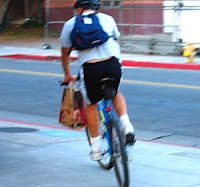Starbucks Admits 3 Out of 4 Stores are Actually Mosques
NEW YORK - Hoping to end once and for all a groundswell of anti-Islam sentiment, Starbucks admitted Wednesday that three out of four of its 250 Manhattan stores are actually mosques. “It’s a marketing approach that encourages Americans of all religious backgrounds to ‘come for the double-shot caramel macchiato, stay for the prayers,’” said a Madison Avenue Starbucks imam Lew Singletary.
Starbucks CEO Howard Schultz says the announcement was meant to allay people’s fears about the encroachment of the controversial religion as being a herald of a Muslim takeover of American culture. “Our mosque outlets have been seeing consistent 8-12% increases in year-to-year same-store sales, and no one makes a big deal out of it as long as the coffee’s strong, the music’s kind of hip, and the men are served first,” Shore said brightly. “And I’ll put our fair-trade Afghan qahwa blend up against the bathwater lattes McDonald’s is selling any day of the week. Well, maybe not Fridays.”
“People have been coming here for years with no problem. In fact, the term “no worries” was coined by our marketing department for use by our counter people to acquaint Americans with the positive aspects of Islam,” said Singletary, whose real name is Bashir, “Look, we’ve been good neighbors even before anyone knew we were here. I don’t get all the paranoia and fear. We sell coffee and pastries. You either want it or you don’t. Try getting through the morning without us.”
Most of the mosques look like any other Starbucks save for the distinctly Middle Eastern motifs and the groups of men praying fervently enough to warrant dirty looks from local raconteurs, soccer moms and itinerant screenwriters. “I always wondered what they were doing,” said Donna Clarick, ordering a huge iced drink. “They’re in here every day and they never seem to have coffee. But it’s New York. If you don’t like it, get your morning fix at 7-11. Know what I mean?”
To distinguish mosque stores from nonsectarian Starbucks, female baristas are now given the option of wearing the familiar green baseball cap and apron or a tastefully branded Starbucks hijab. Mosque stores are also keeping close tabs on the friendly flirting that takes place between the counter people and regular customers.
“Eye contact between men and women and looking at the face is considered the same as ‘awrah—the most intimate personal parts of a body, filthy in their assumptions and possibilities,” said Salih Al Mohri, the ayatollah overseeing the New York Starbucks strategy. “But, hey, we’re not going to go all ‘Taliban’ over it.”
While much political hay is being made both pro and con over the proposed “Ground Zero Mosque” in lower Manhattan, the Starbucks mosques have been received with little or no notice at all. “We’ve been here for years and we’re here to stay, believe me,” said barista Alik al-Mossari. “Although that little screw-up about making first responders to the 9/11 attacks pay for bottled water almost sank us. But that wasn’t political. That’s just Starbucks.”
“We think the innovation of the Starbucks mosque is an idea whose time has come,” Shore said. “And in our corporate spirit of innovation, we’ve got plans for a new phase of stores that will make Opus Dei a household name.”


Comments
Post a Comment
I welcome and appreciate your comments, both positive and constructively negative. Feel free to speak your mind!